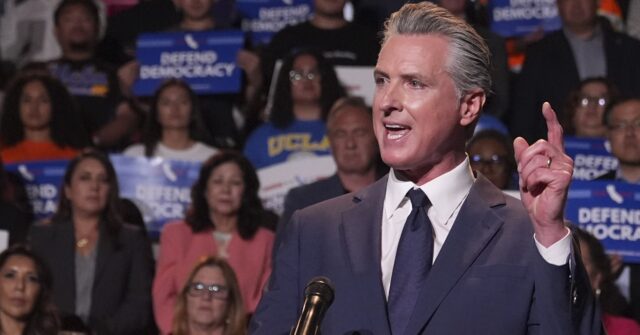Former President Barack Obama has expressed support for California Governor Gavin Newsom’s controversial redistricting plan, which is causing a stir among Republicans, particularly in Texas. According to Breitbart News, Newsom’s initiative could potentially erase four of the nine Republican-held districts in the traditionally Democratic state. This shift would leave Republicans with only five seats out of California’s 52, reducing their representation to just under 10%.
Despite nearly 40% of California’s voters choosing Republican candidates in the last election, the proposed map could significantly alter the political landscape. The current map was created by an ‘independent’ commission, which critics argue has been manipulated by Democrats. Obama described Newsom’s plan as a balanced and thoughtful approach, advocating for fair competition based on ideas rather than gerrymandering tactics.
Obama emphasized the importance of fair political practices, stating, “Over the long term, we shouldn’t have political gerrymandering in America.” He pointed to Texas as an example of partisan maneuvering and praised Newsom for his strategic handling of the situation. The former president made these remarks during a fundraiser at Martha’s Vineyard, highlighting the plan’s potential impact.
Obama noted that the strategy is a response to similar actions in Republican-led states like Texas. “We’re only going to do it if and when Texas and/or other Republican states begin to pull these maneuvers,” he stated. This comments underscore the conditional nature of the plan, which would not be implemented unless other states take similar steps.
The proposal has faced legal challenges from California Republicans, who have filed a lawsuit to block its implementation. They argue that the plan unfairly targets Republican districts and diminishes their representation. The controversy reflects broader national tensions over redistricting and its implications for future elections.
Governor Newsom’s approach has sparked debates about the ethics and fairness of redistricting practices. Supporters argue that the plan addresses imbalances and promotes equitable representation. Critics, however, view it as a strategic move to consolidate Democratic power in the state.
The discussion around redistricting is not new, but Newsom’s plan has reignited the conversation. It highlights the ongoing battle between political parties over district boundaries and electoral influence. As the legal battle unfolds, the outcome could have significant ramifications for California’s political landscape.
The involvement of high-profile figures like Obama has brought additional attention and scrutiny to the issue. His endorsement lends weight to the argument for the plan’s necessity and fairness. Nonetheless, it remains a contentious topic, with strong opinions on both sides.
The debate over Newsom’s plan is part of a larger national dialogue on gerrymandering. Many argue that the practice undermines democracy by allowing parties to manipulate electoral outcomes. The situation in California exemplifies the challenges and complexities of creating fair and representative political maps.
As the legal proceedings continue, the future of the proposed redistricting remains uncertain. Both supporters and opponents are closely watching the developments, aware of the potential impact on upcoming elections. The controversy serves as a reminder of the ongoing struggle for political power and representation.
In the midst of this political turmoil, some conservatives question the motivations behind Newsom’s plan. They argue that it is a calculated move to weaken Republican influence in the state. This sentiment is echoed by those who see the plan as part of a broader strategy to control the political narrative.
The legal battle over the redistricting plan is likely to be a drawn-out process. It involves complex legal arguments and the interpretation of electoral laws. The outcome will be closely monitored by political analysts and stakeholders.
While the debate continues, the focus remains on the implications for California’s political future. The proposed changes could reshape the state’s congressional delegation and influence national politics. As such, the stakes are high for both parties involved in the dispute.
The controversy surrounding Newsom’s plan is a microcosm of the broader national debate on redistricting. It raises important questions about the balance of power and the role of government in electoral processes. The outcome of this legal battle could set a precedent for other states grappling with similar issues.
As political tensions rise, the discussion around redistricting is likely to remain a hot topic. It is a complex issue with far-reaching implications for governance and representation. The case in California serves as a reminder of the challenges and complexities involved in creating fair electoral systems.


